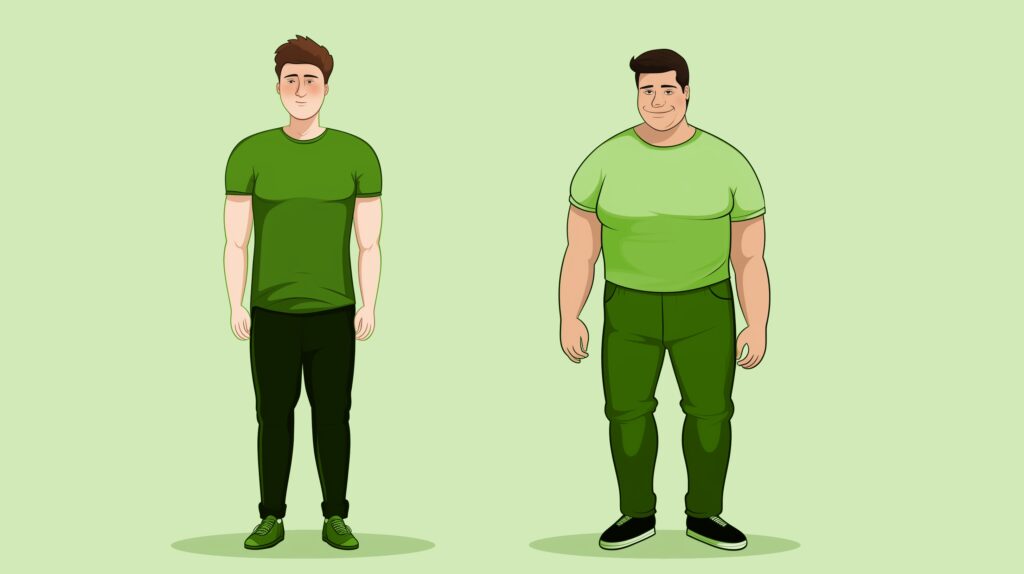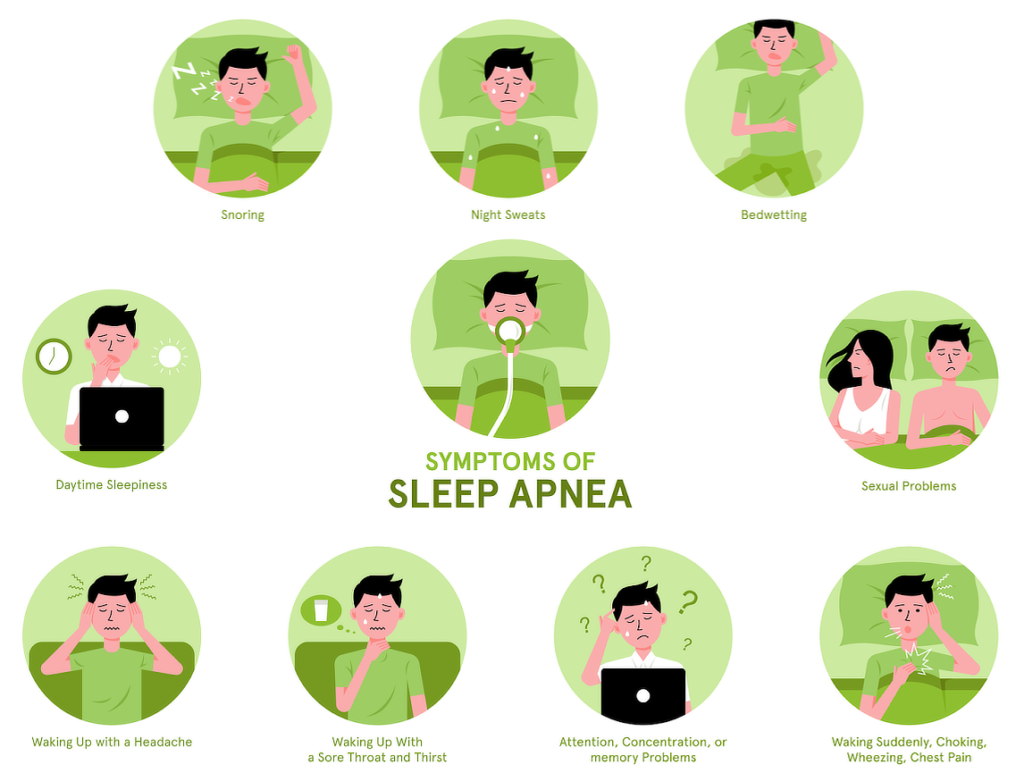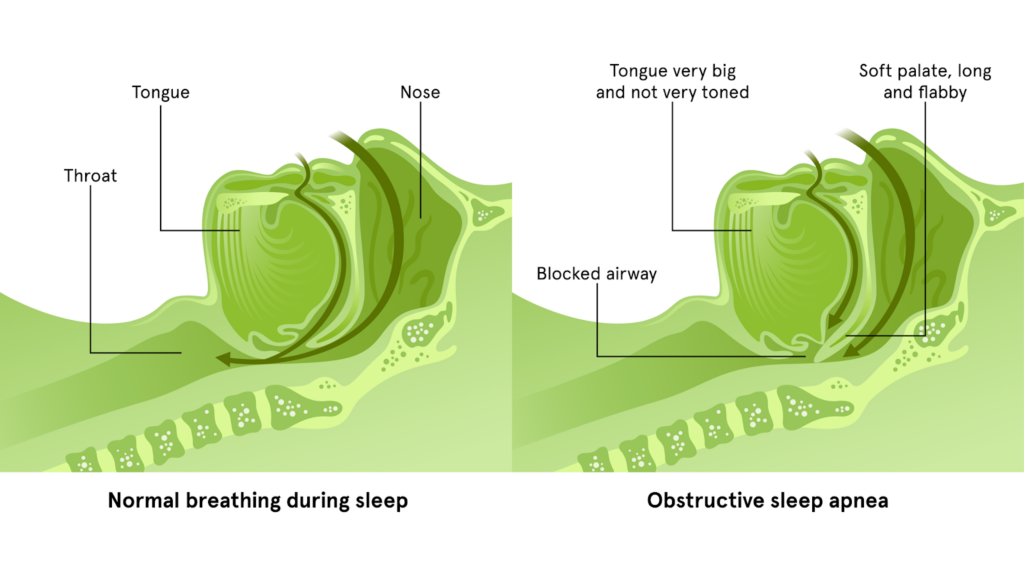Does sleep apnea cause weight gain?
This question intrigues many, especially those witnessing changes in their weight alongside sleep disturbances.
The link between sleep apnea, a prevalent sleep disorder, and weight gain is complex and multifaceted.

It’s widely known that obstructive sleep apnea (OSA), the most common form of sleep apnea, is notably influenced by body weight.
However, the relationship is bidirectional—weight gain can exacerbate sleep apnea, which may contribute to further weight gain.
This article delves into the intricate dynamics of this relationship, offering insights for effective management and highlighting the potential role of continuous positive airway pressure (CPAP) therapy in breaking this cycle.
A Brief Primer on Sleep Apnea and Its Symptoms
OSA occurs when the throat muscles intermittently relax and block the airway during sleep.
This leads to frequent breathing interruptions, resulting in poor sleep quality.
Critical indicators of OSA include loud snoring, headaches upon waking, and chronic daytime fatigue despite sufficient sleep duration.

Timely detection and management of OSA are vital to prevent its progression and associated health risks, such as cardiovascular diseases and metabolic disorders.
The Role of Body Weight in Developing OSA
Excess weight, particularly around the neck, increases the likelihood of developing OSA.
Fat deposits in this area can obstruct the upper airway during sleep, a primary factor behind the disruptive snoring associated with the condition.
This fat can narrow the airway, complicating breathing during sleep and causing apnea episodes—periods where breathing temporarily stops.

Moreover, obesity can lead to reduced lung capacity when lying down due to the increased weight and pressure on the lungs. This further increases the risk of airway collapse.
Hormonal changes related to obesity can exacerbate OSA by promoting fluid retention, particularly in the legs, which may shift to the neck area when lying down, further complicating the management of these interconnected conditions.
How Sleep Apnea Can Encourage Further Weight Gain
However, as with sleep apnea’s cyclical relationship with insomnia—where sleep apnea leads to sleeplessness, which further encourages sleep apnea—sleep apnea can also lead to weight gain, increasing the severity of apnea symptoms.
In this section, we’ll look at a few ways this commonly occurs.
Hormonal Changes Resulting From Insufficient Rest
Insufficient sleep disrupts hormonal balance. While this can impact several areas, appetite control is the most relevant to weight.
Studies have shown that people living with untreated sleep apnea have elevated levels of ghrelin—a hormone associated with hunger—and decreased leptin—a hormone associated with feeling sated.
This one-two hormonal punch can increase hunger and decrease satisfaction once you eat. The result is a tendency to both overeat and choose high-calorie food options.

Inadequate sleep also impacts insulin sensitivity, potentially complicating weight management, contributing to weight gain, and increasing the risk of developing diabetes.
Thus, OSA can indirectly promote weight gain through these hormonal changes.
Fortunately, studies have also shown that PAP therapy is effective for managing sleep apnea symptoms and that as apnea episodes decrease and sleep quality improves, hormone levels return to normal levels quite quickly.
Physical Activity Limitations Due To Daytime Drowsiness
Daytime drowsiness, a prevalent symptom of sleep apnea, can limit physical activity.
Like hormonal changes, this is another two-pronged attack on your healthy lifestyle and the ability to maintain your weight.
Fatigue reduces energy levels, making it harder to accomplish your daily tasks.
For many, the first things to disappear when it is hard to manage your daily routines are the optional items, such as exercise or preparing healthy meals.
This encourages unhealthy eating and an increasingly sedentary lifestyle, which, in turn, promotes further weight gain.
As weight increases, energy levels decrease along with physical mobility—making physical activity such as exercise not just emotionally harder but physically more demanding.
The result is weight gain, sometimes rapid, directly linked to sleep apnea.
Fortunately, PAP therapy is proven to quickly help restore energy levels, reduce daytime drowsiness, and limit fatigue, allowing you to rebuild healthy routines and habits that encourage weight loss.
The Health Implications of Coexisting Obesity and Sleep Apnea
Unfortunately, the weight gain cycle is just the start of a chain of potential side effects. The combination of obesity and sleep apnea poses significant health risks, particularly to cardiovascular and metabolic health.
Sleep Apnea’s Effect on Cardiovascular Health
OSA is linked with several cardiovascular issues, including hypertension, coronary artery disease, congestive heart failure, and stroke.
The combination of obesity and OSA increases these risks due to factors like chronic inflammation and oxidative stress from intermittent hypoxia during sleep apnea episodes.

However, as with hormone levels, numerous studies have shown a rapid improvement in blood pressure and echocardiogram parameters.
According to coverage in Medical News Today, two recent studies found that continued use of CPAP therapy reduced the chance of hospitalization due to cardiovascular disease by 16 percent and the risk of dying from cardiovascular disease by 36 percent.
The Correlation Between Obesity Hypoventilation Syndrome and OHS
In individuals with both obesity and OSA, there’s an elevated risk of developing obesity hypoventilation syndrome (OHS).
Also known as Pickwickian Syndrome, this is a breathing disorder that affects some individuals who are obese, typically those with a body mass index (BMI) over 30 kg/m².
It is characterized by a combination of excessive body weight and chronic hypoventilation (inadequate breathing), leading to low oxygen levels and high carbon dioxide levels in the blood during wakefulness.
People with OHS often experience daytime sleepiness, fatigue, and headaches and may also suffer from shortness of breath, especially with exertion. At night, their breathing troubles can lead to severe sleep apnea, a condition where breathing stops and starts repeatedly during sleep, causing fragmented sleep and further reducing oxygen levels.
It’s easy to see how these two conditions can easily create a cycle that exacerbates the symptoms of both disorders.
Fortunately, these similarities also mean that effective treatments are often similar. CPAP and BiPAP devices are leading options to reduce OHS systems and help return to a healthier, more active lifestyle.
Can Losing Weight Cure Sleep Apnea?
So, with all this talk of this self-perpetuating cycle between weight gain and sleep apnea, you might wonder if the reverse is true: can losing weight help to reduce the impact of sleep apnea symptoms, further helping you lose more weight until the condition disappears completely?
For mild cases, this may be true. However, while weight loss can significantly improve OSA symptoms for more severe cases, it may not be a complete cure.
The approach to weight loss—whether through diet, exercise or, in severe cases, bariatric surgery—can all play a role in managing OSA.

Diet and exercise aid in weight reduction and improve lung function and cardiovascular health, which are essential for managing OSA.
A healthier BMI reduces neck fat, thereby alleviating airway obstruction during sleep.
Increased energy levels from weight loss can also combat daytime drowsiness associated with OSA.
But even if you cannot completely cure your sleep apnea through a healthy diet, exercise, and weight loss, you will enjoy a higher quality of life and significantly reduce the mortality risk factors typically associated with sleep apnea.
Frequently Asked Questions About The Relationship Between Sleep Apnea and Weight Gain
How Much Weight Do You Gain from Sleep Apnea?
The amount of weight gain attributable to sleep apnea varies among individuals, depending on factors like the severity of the condition, lifestyle choices, and metabolic rate.
Can Sleep Apnea Make It Hard to Lose Weight?
Yes, sleep apnea can make weight loss challenging due to sleep deprivation, which can increase hunger and decrease metabolism, complicating efforts to shed pounds.
Furthermore, poor sleep quality can reduce energy levels, making physical activity and strenuous exercise more challenging.
Why Do CPAP Users Gain Weight?
Some CPAP users might experience minor initial weight gain due to factors like water retention or increased lean body mass resulting from improved sleep quality.
However, long-term CPAP use typically supports healthier weight management through better sleep and enhanced energy levels.
Is there a link between the improvement of sleep apnea symptoms and a decrease in appetite?
Yes, treating sleep apnea, particularly with CPAP therapy, can lead to a normalization of the appetite-regulating hormones ghrelin and leptin.
This normalization can reduce excessive hunger and cravings for high-calorie foods, making it easier for individuals to adhere to healthier eating habits and potentially lose weight.
Can bariatric surgery be an effective treatment for sleep apnea in overweight patients?
Bariatric surgery, which leads to significant weight loss, can be an effective treatment for reducing the severity of sleep apnea if you are morbidly obese.
However, it’s typically considered after other treatments have failed, and you must be evaluated and monitored by a healthcare team specialized in sleep disorders and weight management throughout the process.
Conclusion
In unravelling the intricate web of sleep apnea and weight gain, it’s clear that understanding and addressing these interconnected issues is vital for your health and well-being.
While the cycle of sleep disturbance and weight gain is daunting, there’s a beacon of hope in the form of Continuous Positive Airway Pressure (CPAP) therapy.
CPAP Supply, Canada’s leader in customer satisfaction, stands ready to guide you through optimizing your PAP therapy equipment and ensuring you achieve the comfortable, restful sleep you deserve.
Don’t let another night slip away. Contact CPAP Supply for personalized support and take a decisive step towards breaking the cycle, managing your weight, and embracing a healthier, more vibrant life.
Your journey to better sleep and better health starts today.
References:
- ResMed: Why does sleep apnea cause weight gain?
- Mayo Clinic: Sleep Apnea
- American Sleep Apnea Society: Weight gain & sleep apnea
- NIH: Weight Loss Is Integral to Obstructive Sleep Apnea Management. Ten-Year Follow-up in Sleep AHEAD
- NIH: Up, down, or no change: weight gain as an unwanted side effect of CPAP for obstructive sleep apnea
- WebMD: Sleep and Weight Gain

